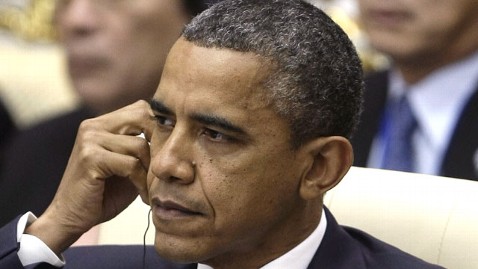In Cambodia, Obama Hails 'Constructive' US-China Relationship

AP Photo/Heng Sinith
PHNOM PENH, Cambodia - President Obama today said the United States and China have taken a "cooperative and constructive approach" to their relationship, as he came face-to-face with the rising economic power that his administration is trying to counter-balance in the region.
Meeting with outgoing Premier Wen Jiabao on the sidelines of the East Asia Summit, Obama reiterated his commitment to working with China, despite the tenuous relationship between the two economic superpowers.
"It's important that our two countries cooperate to build a more secure and prosperous future for the Asia Pacific region and for the world," he said. "As the two largest economies in the world, we have a special responsibility to lead the way in ensuring sustained and balanced growth, not only here in Asia but globally."
In his first post-election meeting with a Chinese leader, Obama stressed that "we work to establish clear rules of the road internationally for trade and investment, which can increase prosperity and global growth."
Obama cast an optimistic tone at what will likely be his last meeting with Wen Jiabao. The Premier and Chinese President Hu Jintao are stepping down following China's once in a decade leadership changes.
Obama is paying the first visit by an American president to Cambodia, a country trying to emerge from its violent and repressive past. The president arrived Monday night and went straight to what has been described as a "tense" meeting with Prime Minister Hun Sen, the 60-year-old leader who has been in power since former President Ronald Reagan was in the White House.
Obama devoted their private discussion entirely to pressing Hun Sen on human rights issues, calling for fair elections and the release of all political prisoners, according to Deputy National Security Adviser Ben Rhodes.
"[Obama] highlighted a set of issues that he was concerned about within Cambodia, in particular I would say the need for them to move towards elections that are fair and free, the need for an independent election commission associated with those elections, the need to allow for the release of political prisoners, and for opposition parties to be able to operate," Rhodes said. "He highlighted, for instance, one case of a radio broadcaster who's been sentenced to many years in prison simply for something that they said on the radio. He discussed the issue of land seizures, which have been a challenge for the people of Cambodia."
"It's necessary for us to continue to raise these issues directly with countries like Cambodia at the same time that we also foster positive examples that offer a better path so that people can see the results that come with reform," he said.